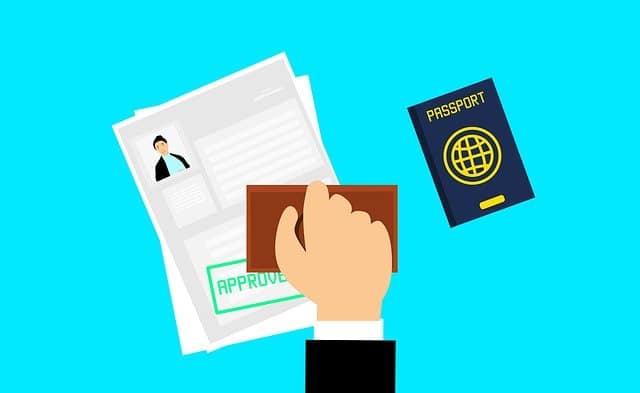I decided to quit working at home and took a year-long trip around Europe to work remotely while traveling, which materialized fabulously.
But beware of many challenges that will come your way in the form of permits, visas, and taxes.
Therefore, you can consider traveling places while working remotely, accomplishing both your travel needs and finances.
A study by Upwork attests that 22% of Americans will be working remotely by 2025.
You can work remotely while traveling by assessing the legality of work from abroad, work visas, tax implications, and if your employer allows traveling while working remotely.

Moreover, you should pick a convenient destination where you could work, such as a hotel room and skype colleagues on the go.
Traveling while working remotely may seem quite complicated. Read on if you are a novice trying to work remotely while traveling abroad.
Table of Contents Show
Can You Work Remotely While Traveling?
In short, Yes and No!
Working remotely has allowed workers to choose to work from any place. However, the restrictions kept in place by many foreign countries on remote workers may say otherwise unless they can get proper approvals.
It is legal to work remotely from another country, but you must comply with their visa and tax requirements.

Many countries, including Thailand, Portugal, Mexico, Norway, and Czech, offer digital nomad visas to tourists who wish to work remotely.
Regarding paying taxes in many countries, it usually comes down to whether you sell goods to the local market or perform work for local employers.
If not, you are less likely to pay taxes for remote work, but some countries may levy taxes after spending a specific time in the country.
Therefore, you can get by working remotely while actively traveling to different countries.
However, it is always best to learn about the country’s remote work policy before traveling to avoid being penalized.
Are There Any Disadvantages to Working Remotely While Traveling?
When working remotely, you will face many distractions from poor internet, crowd, noise, and other factors that may hamper your daily work routine.
The cyber-security concerns are always looming when traveling abroad, including hacking, data pilferage, ransomware, viruses, etc.
Moreover, a lack of communication is expected when you share an opposite time zone than your colleagues.

Carrying all the gadgets and times you travel from city to city can also become a hassle. In addition, expect some loss of work-life balance when actively traveling while working remotely.
However, working remotely comes with many different benefits despite all the naysay.
What to Consider Before Travelling While Working Remotely?
You should know about the country’s remote work policy before considering traveling because you do not want to be fined.
There are a few considerations you should look into before planning a remote work trip.
1. Overall Visa Consideration
The countries have visa implications for remote working.
For instance, if you are a U.S. citizen working while traveling, some countries allow you to work on a tourist visa until the scope of work is limited to the land of residence.
However, do not rely on a tourist visa, as you could be detained or deported.

Digital Nomad Visas allow you to work remotely from abroad without needing to apply for residency or citizenship.
Digital Nomad Visas work in many countries, including Australia and New Zealand, Netherlands, Cambodia, Germany, Ireland, China, Singapore, Ecuador, South Korea, Canada, and the Czech Republic.
For example, the UAE government allows you to live in the country while continuing to work remotely for one year by obtaining a remote work visa.
Check the country’s official website before traveling to learn more about obtaining a visa for remote work.
2. Employer’s Permission
It would help if you determined whether your employer allows you to travel while working remotely.
Many companies specializing in online operations would allow their employees to travel abroad and work remotely.
However, it will be wise to know from your employer beforehand because it could leave them open to paying taxes and obtaining permissions for remote work.
Many countries levy permanent establishment policies to workers who spend significant time working in the country, where your employer would end up paying multiple taxes and fees.
Therefore, talk to your employer before considering traveling while working remotely.
3. Primary Focus of the Trip
Working remotely while traveling to popular holiday destinations worldwide may sound like a rewarding experience.
However, it would help if you also were wary about the work schedule and timing.
For instance, if you attend a virtual meeting every day at a particular time, you should avoid traveling at that time or staying online while on the go.

Similarly, exchanging emails and keeping in touch with colleagues may become challenging when constantly moving.
Therefore, determine your purpose of travel and how much time you could give to work daily.
Getting relieved in the middle of the trip is the last thing you want to hear.
4. Travel Insurance Cover
While traveling abroad, you risk getting into accidents or similar incidents requiring insurance coverage.
First, you need health or medical insurance. And secondly, you would need theft insurance coverage for your gear, such as a laptop, camera, etc.
Nonetheless, the insurance coverage is standard, whether you travel for pleasure or work.
Depending on your travel, you should acquire an insurance policy that provides the maximum coverage, such as medical, hospital stay, emergency rescue, medical evacuation, COVID coverage, theft, etc.
Check with Nomad Insurance-SafetyWing for travel medical insurance coverage around the world.
Otherwise, find an ideal policy under Heymondo insurance for an extended stay abroad.
5. Tax Implication
Every country operates under its tax code; hence, the taxation of remote travel workers may differ.
You would usually owe taxes in the country of your permanent residence and where you live and work if you begin making gains in that country.
For instance: U.S. citizens earning above $100,000 annually owe taxes while working abroad.
Many countries require you to stay 183 or more days to be a tax resident.

Misclassifying taxes could land the remote worker and employer in trouble.
Consult with your accountant or check the country’s tax legislation to determine how and when you will be taxed.
Kathleen Di Paolo on Linkedin points out that even though taxes are levied on an employee’s income tax rate, many compliance requirements can burden the employer, which comes with high administrative costs.
11 Productivity Tips for Working Remotely While Traveling
Working on the road sounds fun, but it will soon be unproductive because of an ill-managed work schedule.
Here are a few proven tips to help boost your productivity while working remotely when traveling.
1. Join a Remote Work program
One way to find opportunities to work remotely while on the road is by actively looking for remote work programs.
That is great if you already have an employer willing to send you abroad! If not, then consider joining the remote work program.
Remote work and travel programs are becoming popular lately, with many countries accepting this form of travel.
A few popular remote travel programs include Wifi Tribe, Remote year, Unsettled, Hacker Paradise, and Project Getaway.
Most sites charge annual membership and monthly fees throughout the travel duration.
One great thing is that they offer accommodation, travel options, entrance fees, and include some meals.
2. Pick a Safe Destination
Many destinations are marked as potentially unsafe for first-time solo travelers due to rising cases of crimes, theft, kidnapping, contagious disease, etc.
Therefore, begin with researching the place you are traveling to minimize risks.

Here are a few pointers to give you a head start.
- Check what your country’s official website and government portal say about the country you intend to visit.
- Get vaccinated and take precautions against the disease or contagions in the said country.
- Avoid drinking tap water and always use filtered or bottled water for consumption.
- Save emergency contact numbers for Police, ambulance, local embassy, and insurer.
- Always carry an emergency cash stash in a separate bag.
- Keep in touch with friends or family back home.
3. Find a Dedicated Work Space
Once you have decided on the destination, find dedicated workspaces. For example, you can work in your hotel or hostel room when working.
You can also choose restaurants or cafes, but constantly moving from one place to another may seem implausible.
Remember, your workspace needs to be comfortable with ample lighting, less noise, and proper seating.

Long-term rental of Airbnb places is another option to find a cheap place to stay and work remotely while traveling.
According to the Airbnb , stays longer than 28 days are subjected to a long-term cancellation policy where the first month’s stay remains non-refundable.
Otherwise, you can find coworking space to share the costs of a workroom.
Coworking Nomads, Upsuite, HubbleHQ, and First Office Hub are a few examples.
4. Pack Appropriately for Remote Work and Travel
Pack appropriately for travel and remote work, and do not hesitate.
Imagine undoing your luggage at the hotel only to find you have forgotten your laptop charger at home.
Therefore, it is essential to list all the items you cannot do without on the trip. Consider work-related items over fringe travel items when packing to avoid the risk of buying new things.
Remember to pack your laptop, laptop sleeve, small-sized wireless charger, noise-canceling headphone, laptop stand (optional), keyboard and mouse, and wifi adapter.
Do carry a formal shirt and tie if you regularly attend official meetings over the laptop.
5. Create and Stick to a Remote Work Routine
When traveling, you may frequently miss out on remote work due to an unmanaged routine. Therefore, it is wise to make a routine that you can stick to.

Here are a few routine tips you should follow.
- Block your non-work hours to determine how much time you have every day.
- Add uninterrupted focus time in your schedule, about 50 to 60 minutes, before taking a break.
- Schedule meetings early in the morning or later in the noon to keep the daytime for travel.
- Schedule breaks like scheduling essential meetings.
- Create ground rules such as not inviting friends during work.
- Do not take on more tasks than you can handle.
- Reschedule the work or meeting to a later time or the next day when traveling the whole day.
- Keep weekends for full travel, self-care, spa visits, etc.
6. Communicate with Colleagues and Clients
Always stay in the loop with your colleagues and clients to let them know you are on the project, even when traveling abroad.
Otherwise, they quickly assume you are indulging when you are supposed to work.
Communicating with colleagues and clients helps you comprehend your deadlines, targets, and goals.

Video conferences, phone conferences, social media messages, or emails are practical ways to connect with your colleagues and clients.
7. Get Essential Devices and Gadgets
Remote work is not possible without gadgets. Do not forget to bring or buy the devices you need for work when traveling.
Here is a list of a few items you should consider bringing along.
| Items | Specification |
|---|---|
| Laptop and peripherals | A laptop and charger, spare laptop battery, compact power strip with built in USB ports , and compact keyboard and Bluetooth mouse |
| Electrical appliances | A travel router smartphones, and tablets with chargers, headphones or mini speakers, DSLR Camera, |
| Accessories | Camera lens, Go Pro with a stick, SD cards, and pen drive, , portable power banks universal plug adapter, Bluetooth adapter and spare batteries |
Most of these items will also be handy for remote work trip purposes.
8. Download Useful Software
Download helpful software and fill your laptop, tablet, and phone with essential software and app to help you stay productive.
The market is flooded with software that assists with specific or generic activities.
Here are a few examples.
- ClickUp is a collaborative tool where you can create lists or Kanban boards for different projects based on their importance and deadline.
- Slack has features like quick huddles, sharing programming codes, and managing Google docs remotely.
- First base: It is excellent for keeping track of items such as expenses to help prevent you from offboarding.
- Google Docs: Share and edit your documents virtually through Google docs with your teams for collaboration.
- Zoom: Video call and meeting is an inescapable part of working remotely.
9. Determine the Cost of Living
The most important thing to keep track of when traveling is the cost. Always track how much money you spend daily, weekly, or monthly.
Running short of money when traveling and working remotely can be disastrous, significantly when your payment gets delayed by days or weeks.

Consider spending the hotel or Airbnb fees, internet costs, daily meals, laundry, etc., first.
Remember to make a budget whenever you are traveling and segment those costs based on activities or time duration.
For example, make a budget for a hotel stay for a week or month, the cost of three-time meals and drinks, transportation if required, and internet if applicable.
Additionally, designate the money in your account for payments of essential items first.
Similarly, pay using UPI and online payment apps to enjoy various offers and avoid the risks of losing cash.
Pro Tip: Keep some spare cash with you safe nonetheless.
10. Understand Times Zones
When working remotely from a different part of the world, matching the time zones will always become a hassle.
For instance, you cannot expect to video call your client who lives in the U.S. at noon when you work at some place in Asia.
Asynchronous communication is standard when working in different time zones, but you should find a solution.
Determine what time your colleagues and clients are active and match it to yours.
Generally, meetings, chats, and exchanging messages in the morning or evening would work for both parties.
Pro Tip: Use the app World Time Buddy to keep track of your work based on different time zones.
11. Check for wifi Requirements
The wifi speed will not be the same at every destination. Expect internet lag when traveling to overtly crowded or secluded places.
The wifi provided by most hotels and Airbnb works just fine for video meetings and streaming video content.

Always inquire about the wifi speed and availability when traveling abroad so you can plan. You can always test the local internet speed using online apps like Fast.com.
Carry a travel router with you at all times to connect many gadgets to wireless networks without hassle.
Otherwise, you can get a local SIM card and buy internet packets at a discounted price.
It is easy to acquire local sims where you are traveling. Go to the local telecom store and buy a temporary SIM by providing your passport copy and photos.
You can even buy SIM cards from local stores in many Asian countries for a very reasonable price.
However, do inquire about the charges of the data plan provided by the telecom. If the rates are expensive, you should stick to the wifi.
You may be interested in reading about; Working from home with slow internet
Final Verdict
Working remotely can become a rewarding experience, especially when you love traveling.
Moreover, you may not fear losing your job when working remotely from another city or country, offering you freedom.
However, constantly research before traveling abroad and discuss with your employer to determine whether remote work on the go is possible!
Make your travel and remote work session fun by planning.
Related Article: 11 Tips to Not Being Lazy When Working From Home


